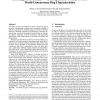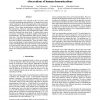377 search results - page 35 / 76 » Learning with Knowledge from Multiple Experts |
149
Voted
ASPLOS
2008
ACM
15 years 4 months ago
2008
ACM
The reality of multi-core hardware has made concurrent programs pervasive. Unfortunately, writing correct concurrent programs is difficult. Addressing this challenge requires adva...
120
Voted
ICRA
2002
IEEE
15 years 7 months ago
2002
IEEE
This paper describes a new approach on how to teach a robot everyday manipulation tasks under the “Learning from Observation” framework. Most of the approaches so far assume t...
122
Voted
ICRA
2010
IEEE
15 years 1 months ago
2010
IEEE
— In this paper, we consider the problem of how background knowledge about usual object arrangements can be utilized by a mobile robot to more efficiently find an object in an ...
125
Voted
IJAR
2007
15 years 2 months ago
2007
The use of several types of structural restrictions within algorithms for learning Bayesian networks is considered. These restrictions may codify expert knowledge in a given domai...
108
Voted
AAAI
1996
15 years 4 months ago
1996
Rule induction research implicitly assumes that after producing the rules from a dataset, these rules will be used directly by an expert system or a human user. In real-life appli...


